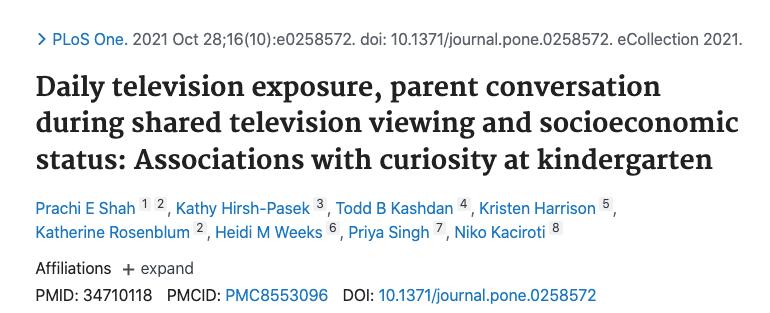Curiosity has always been one of the most important qualities of scientific research, important for children's development and education. Albert Einstein once said, "Curiosity is the most precious quality of human beings." "Many philosophers, psychologists, educators, and even neuroscientists recognize the importance of curiosity. So, do you know how to cultivate your child's curiosity?
A recent study published in PLoS ONE showed that there is a very simple way to cultivate children's curiosity, and the answer must surprise you: watch TV!
Many parents think that watching TV will occupy their children's time and affect their children's learning, and even some people think that watching TV will make children stupid and stupid, but this study tells you to watch TV scientifically, which can cultivate children's curiosity! Don't believe it, little Lotus Medical Code interprets this study for you~

Source: PLoS ONE
The study, based on interviews with kindergarten parents, explored how children's curiosity arises. The study ranged 5100 children aged 9 months, 24 months, nursery schools and kindergartens.
Through parent interviews, the researchers learned how many hours the children watched TV every day, how often parents communicated with their children when they watched TV with their children, and then assessed the curiosity of the children through the kindergarten children's behavior questionnaire.
After the scientists' sophisticated calculations (multiple linear regression), it was revealed that the time the child watched TV and the frequency of communication when the parents watched TV with the child, which would affect the child's curiosity.
The study found that the more frequently parents communicate when watching TV with their children, the stronger the curiosity of kindergarten children. In addition, the study added the factor of family socioeconomic status (i.e., family situation) and found that for children with poor family circumstances, the frequency of communication between parents watching TV with their children and their children's curiosity were more strongly correlated.
That is to say, in daily life, when children watch TV, parents should not let it go, but try to accompany children to watch together, and can communicate and discuss with children on the content of TV, which will help children cultivate curiosity.
The study also analyzed the relationship between how long children watch TV and their curiosity, and the results were not what you might expect — the longer your child watches TV each day, the lower their curiosity. It seems that how to let children watch TV scientifically is really a science.
In 2016, the American Pediatric Association published a scientific guide for children aged 0 to 5 years old on the use of digital media (including television, computers, mobile phones, etc.):
Children under 18 months of age should preferably not use (except for video calls); Children between 18 months and 2 years old should be accompanied by a parent; Children between the ages of 2 and 5 are recommended to use it for less than 1 hour per day.
Knowing the right time for your child to watch TV every day, how to choose a program that is suitable for your child to watch? According to a special study by the China Youth Research Center, there are two types of programs that are most suitable for children to watch:
One category is children's literature works, such as children's literature masterpieces, fairy tale adaptations of feature films, cartoons; The other category is intellectual works, such as nature exploration, popular science topics, science fiction themes, etc.
Parents of children should help children choose these TV programs with educational value, avoid those programs with negative effects from entering the child's field of vision, and avoid children being exposed to violent or bloody scenes. Through good TV programs, open children's curiosity and curiosity.
Image source: Figureworm creative
Finally, knock on the chalkboard:
Regarding how children watch TV scientifically, it is good to grasp these four points:
Companionship: Accompany your child to watch TV Communication: Communicate the content of the TV Pick: Pick the right show Control: Control the time spent watching TV
bibliography:
[1] Shah P E, Hirsh-Pasek K, Kashdan T B, et al. Daily television exposure, parent conversation during shared television viewing and socioeconomic status: Associations with curiosity at kindergarten[J]. PloS one, 2021, 16(10): e0258572.
Huang Qi, Chen Chunping, Luo Yuejia, et al. Mechanism and role of curiosity[J]. Advances in Psychological Science, 2021, 29(4): 723.
Medical Editor: Encore
Content Planner: Duffy
Medical review: Yao Junhua
Content exhibit: Kogari Medical Clinic